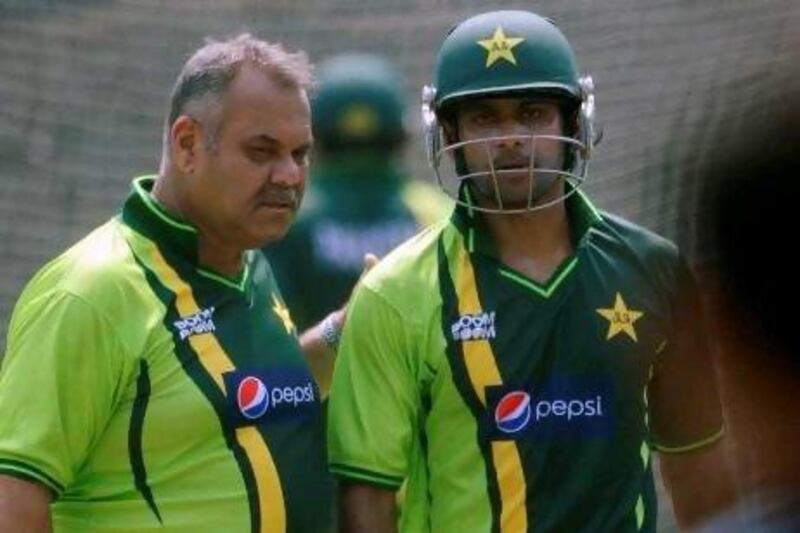In a strong-jawed, decent-man-from-the-1950s way, Mohammad Hafeez cuts a neat figure. When his hair is short, it is well-maintained and parted to one side.
When it grows, it does with order and decorum and stays parted to the side, although as at the press conference on his ascension to the Twenty20 captaincy, he can pull off an inoffensive centre parting too. He wore a neat shirt for the occasion.
Everything about him is neat, including his batting. He defends and drives in nice straight lines, persuading the ball away as if wiping from the crease the mess of ball colliding with bat. Even when he is edging to slips, he looks impeccable, ensuring the entire process of dismissal from the release of the ball to the pouching of the catch looks tidy and whole.
This neatness has earned him leadership. Asked about the motivations in appointing him, one selector said: "He's a clean guy."
He meant it in the sense of integrity, that he is clean from intrigue and corruption but in this case, it all feels part of one theme.
There are better reasons to feel the appointment is a good one. Hafeez is a product of both the flimsiness and robustness of the system in Pakistan.
His route to this point apes approximately the shape of a pretzel. Since debuting in 2003, he has been dropped from the Test side twice for three years each. As a one-day player, he has been given a run, pushed out for a year, given another run, pushed out for another year, recalled again and then forgotten for three years.
Save for coach and masseuse, he has played every conceivable role. Only in July 2010 did the management and player finally settle on an opening, off-spinning all-rounder. "You get to a phase in your career where you finally understand your role," he had said in a conversation before the 2011 World Cup.
"And the management understands it as well."
But it was this system that discovered him, working his way through small-town college and club cricket, on to the first-class scene where he impressed for Sargodha, got selected by an astute and contrary national selector in Aamir Sohail and eventually secured a deal with a departmental side that gained him a livelihood from cricket.
When he was dropped, he neither sulked nor disappeared into a puff of apathy, instead using the system to better himself.
He played and performed domestically but most significant was the role of the National Cricket Academy (NCA) in Lahore, where he worked with Sohail and his batting coach Shahid Aslam.
"The thing about coming back is first acknowledging your mistakes," he had said then. "In 2007, my biggest problem was inconsistency. I had to improve technically, I had to score bigger. Everyday you can improve and with the NCA, you have everything you ever need to make a comeback.
"There is no excuse, because you can use those facilities, coaches, whenever you want."
Sure, in some set-ups he would have been identified and nurtured earlier, but that is just how the wind blows.
He is here now in the position that every cricketer wants to be in and who is to say not better-placed because of his own experience?
How well-placed is he to lead?
He is an intelligent cricketer for he has gone further than many with greater natural gifts.
His bowling is shaped on his own experiences as a batsman, in particular the understanding of where they don't like being bowled to. It is true he thinks deeply about the game, too obsessively in the opinion of some who have worked closely with him.
It is, potentially, a problem: when his game is off, he frets too much about his form, gets too bogged down in technicalities and retreats into a bubble. Otherwise, when the days are bright he is an extremely confident man. He has never doubted his ability as an international player even if others have.
Tracking him over the last two years, the assessment of Rashid Latif, his first international captain, seems most apt. "He is overconfident," Latif said, but adds that it can be both an "advantage and disadvantage."
Captaincy should not overwhelm him, at least not immediately. He has led domestically, though more relevantly has been an involved and influential deputy to Misbah-ul-Haq, a man from whom the captain has often sought advice and support.
As it is, his grasp of people will be more important. Pakistan's Test side is stable but in flux elsewhere. Players are jostling for spots and roles, even leadership.
Shahid Afridi and Shoaib Malik, former captains, are their own centres of influence. Misbah was not happy about the T20 snub – naturally – and though the pair are close, these decisions change the dynamics of a relationship.
In all this, Hafeez's own game will come under increased scrutiny. As worthy as his contributions have been – he still judges his returns as batsman first – he is still one purple patch from being a top batsman; he needs hundreds and more fifties, not just delicious 30s and 40s. That kind of player is never too far from being cast aside.
If he gets it right, greater rewards await. Age and circumstance are on his side.
If he does not then, well, the Pakistan captaincy has a way of leaving even the neatest men in a bit of a mess.
Follow us
[ @SprtNationalUAE ]





